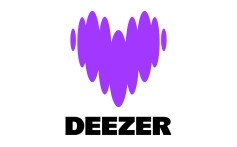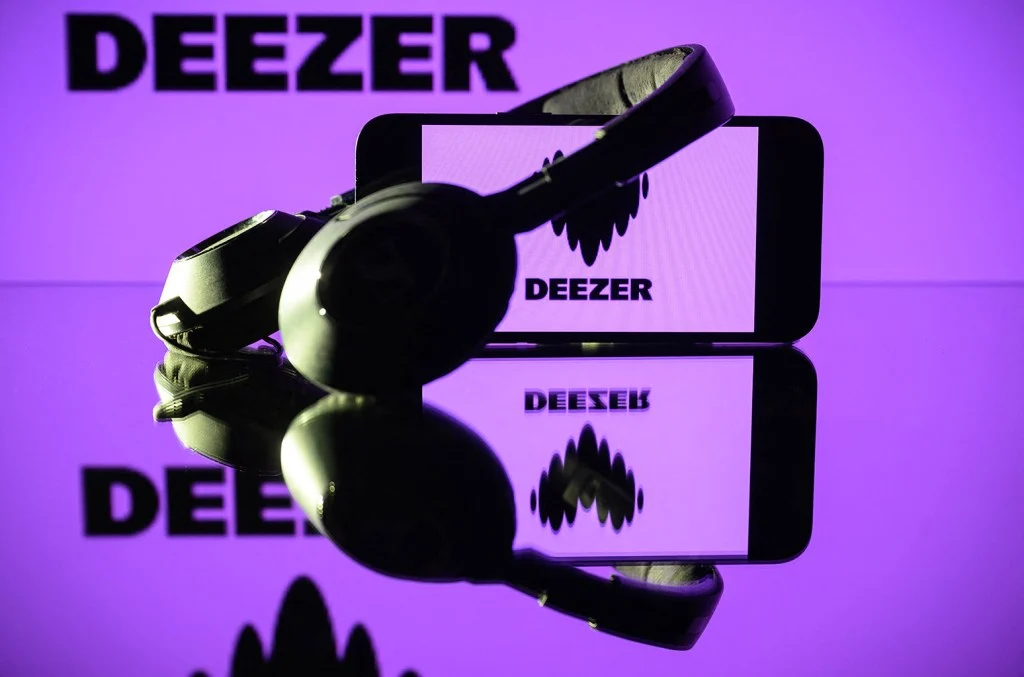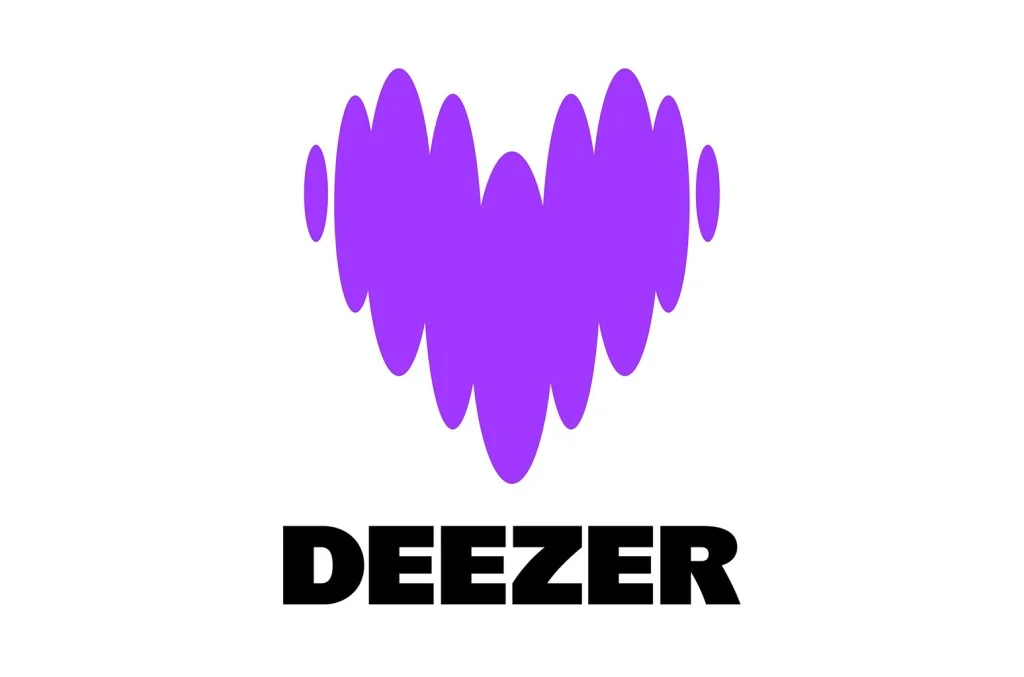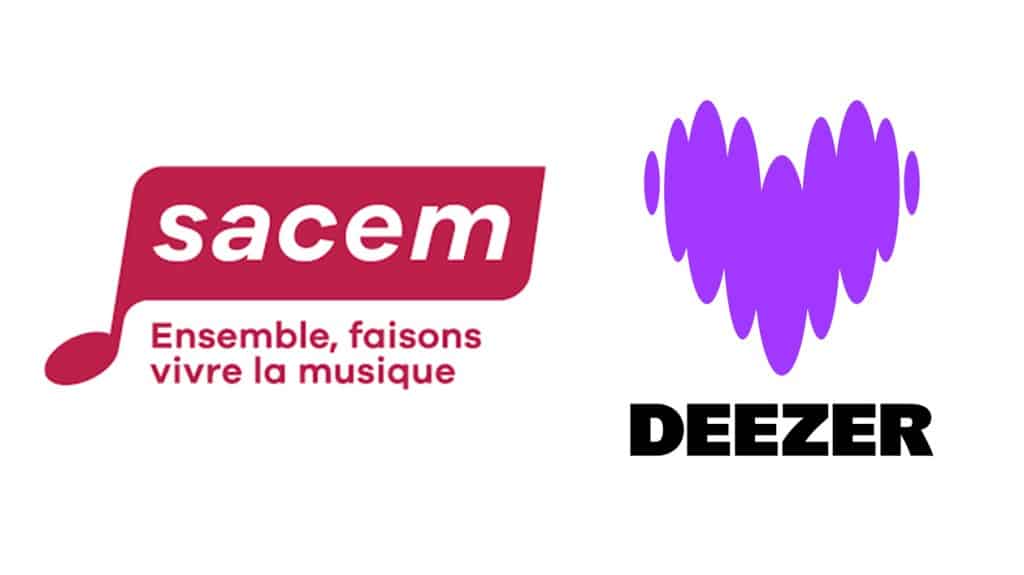Deezer
Trending on Billboard
French streaming service Deezer reported on Wednesday (Nov. 12) that roughly 50,000 songs delivered to the platform daily are now fully AI-generated, in what amounts to the company’s fourth report on the surge of AI-generated content on its service this year.
Along with that statistic, Deezer also released the findings of a new survey about AI’s use in the music industry, including the stat that 97% of people can’t tell the difference between human-made and fully AI-generated musical works.
Related
According to Deezer’s proprietary AI detection tool — which only searches for fully AI-generated songs from select popular models, including Suno and Udio — the number of fully AI-generated songs delivered daily has been rapidly increasing throughout 2025. In January, it reported that the figure was 10,000 songs a day; in April, it noted the figure was 20,000 songs daily; and in September, it reported the number had risen to 30,000 songs daily.
In an interview with Billboard about the company’s AI research in May, Aurelien Herault, Deezer’s chief innovation officer, and Manuel Moussallam, its director of research, said that part of the reason why they were finding a growing number of fully-AI generated songs was simply that their “data got better” — as well as the fact that the overall volume of fully AI-generated songs had increased as more users adopted AI tools like Suno and Udio.
Beyond flagging AI use, Deezer has taken a proactive approach to regulating this content on its platform. To create transparency, Deezer adds a tag to any fully AI-generated work it detects on the platform, while removing it from algorithmic and editorial recommendations and playlists.
To continue its research into the emerging technology and its impact on the music business, Deezer also produced a new survey on the perceptions and attitudes around AI music. The study was executed by Ipsos with a total of 9,000 participants across eight countries — the United States, Canada, Brazil, the United Kingdom, France, the Netherlands, Germany and Japan. Below, you can check out the study’s top findings.
General perceptions about AI:
98% have at least heard of AI
72% used AI at least a few times
55% of the respondents place curiosity as one of their first overall sentiments towards AI
19% place trust among their first feelings towards this new tool
Music discovery creation with AI:
46% think that AI can help them discover more music they like
51% think that AI will play a significant part in music creation in the next 10 years
51% think that AI will lead to the creation of more low-quality, generic-sounding music on streaming platforms
64% believe that AI could lead to a loss of creativity in music production
Recognition and consumption of AI-generated music:
97% couldn’t tell the difference between fully AI-generated music and human-made music in a blind test with two AI songs and one real song
52% felt uncomfortable with not being able to tell the difference between AI and human-made music
66% of music streaming users say they would listen to 100% AI-generated music at least once, out of curiosity
45% of music streaming users would like to filter out 100% AI-generated music from their music streaming platform
40% of music streaming users say that they would skip without listening to 100% AI-music if they came across it
Transparency:
80% agree that 100% AI-generated music should be clearly labeled to listeners
73% of music streaming users would like to know if a music streaming service is recommending 100% AI-generated music
52% of respondents feel that 100% AI-generated songs should not be included in charts alongside human-made songs on the main charts
Only 11% believe that 100% AI-generated music should be treated equally on charts
58% of music streaming users believe that their music streaming platform never recommended 100% AI-generated music to them, while 25% are uncertain
Trending on Billboard
Gains from self-paying subscribers almost equally offset losses from partnerships as French music streaming company Deezer’s revenue fell 0.9% to 131.4 million euros ($154 million) in the third quarter, the company announced Thursday (Oct. 23).
“Subscriber growth in France has accelerated for a third consecutive quarter, confirming the positive impact of our differentiation initiatives in our home market,” CEO Alexis Lanternier said in a statement. “In the rest of the world, subscription numbers in the Direct segment are also picking up pace, reflecting the quality of our service and the appeal of our brand as we champion transparency and fairness in music streaming.
Related
Revenue from partnerships fell 12.6% to 35.6 million euros ($42 million) and subscribers from these partnerships dropped 24.5% from the prior-year quarter. Deezer powers music streaming platforms for numerous companies globally and counts these partnership subscribers separately from subscribers who pay directly. The company attributed the loss in its partnerships business to “the residual impact” of a business model shift by Mercado Libre, a Latin America e-commerce company that partnered with Deezer in 2023. A focus on higher average revenue per user (ARPU) also contributed to the decline in partnership subscribers, the company said.
Direct subscribers grew in number to 5.5 million, up nearly 10%, and direct subscription revenue increased 1.6% to 87.9 million euros ($103 million). France accounted for 3.7 million of those direct subscribers, an 11.7% increase from the prior-year period, which the company attributed to “good performance” of family plans. Direct subscribers from the rest of the world rose 6.1% to 1.8 million.
ARPU from direct subscribers fell nearly 5% to 5.4 euros ($6.31) per month. Partnership ARPU rose 6% to 3.1 euros ($3.62) per month.
Related
Other revenue, which consists of advertising and ancillary revenue, rose 17.4% to 7.9 million euros ($9.2 million). Deezer said the improvement “mainly reflected the performance of the white labelling solutions for hardware / media partners.”
While relatively small compared to the likes of Spotify and Apple Music, Deezer has attempted to separate itself from its competitors by making combating AI music a business priority. In September, the company revealed that it detected the delivery of over 30,000 fully AI-generated tracks each day. That accounts for 28% of all daily track uploads, up from 18% in April and 10% in January. These fully AI-generated tracks are eliminated from Deezer’s algorithmic recommendations and excluded from editorial playlists.
Looking ahead, Deezer confirmed its full-year guidance in which it expects positive adjusted earnings before interest, taxes, depreciation and amortization (EBITDA) and positive free cash flow for the second consecutive year.
Deezer’s total quarterly revenue edged 1.1% higher in the first quarter of 2025, the French streaming company reported on Tuesday (April 29), as its top executive reiterated the company’s target to achieve profitability this year.
Deezer reported revenue of 134 million euros ($145.08 million) in the first quarter, driven primarily by 6.3% growth in its direct subscriber base in France, bringing the total number of subscribers there to 3.5 million.
Deezer achieved positive free cash flow and its first break-even year in fiscal 2024, and CEO Alexis Lanternier said the company will achieve positive adjusted earnings before interest, taxes, depreciation and amortization (EBIDTA) in 2025. Deezer expects total revenue for 2025 to be flat or slightly decline from fiscal year 2024, as it forecast no meaningful increase in average revenue per user (ARPU). However, the company maintained it will “generate positive free cash flow for the second consecutive year,” according to a press release.
Trending on Billboard
“We started the year with positive momentum, delivering revenue growth in line with our expectations and further increasing our direct subscriber base in France,” Lanternier said in a statement. “With confidence, we confirm our 2025 guidance and our objective of reaching profitability this year.”
Founded in August 2007, Deezer has embarked on a range of initiatives aimed at achieving profitability, including raising prices on its direct subscribers in France; doubling-down on its strategy to gain subscribers through partnerships with companies like the German broadcaster RTL, American speaker company Sonos and Latin America’s Mercado Libre; and through the introduction of new customization features for users and opportunities to directly interact with artists.
Deezer’s total subscriber base now stands at 9.4 million, down from what it said was 10 million subscribers on a like-for-like basis in the first quarter of 2024. Of those 9.4 million subscribers, 5.3 million are direct subscribers, mostly in France, while 4.1 million subscribers come from partnerships. Revenue from Deezer’s direct subscriber base contributed 86.6 million euros ($93.8 million), up from 86 million euros ($92.8 million) a year ago. Partnership subscribers contributed 39.2 million euros ($42.4 million), down from 43.3 million euros ($46.7 million) a year ago.
The decline in partnership subscriptions, which drove an overall 3.4% drop in the revenue Deezer receives from countries outside of France, was primarily due to the conversion of users who came to Deezer through its partnership with Mercado Libre called MeLi+. Some promo users converted to premium users “with higher [average revenue per user] & margins,” the company said. The decline in partnership subscriptions and revenue was partly offset by a ramp up in Deezer’s partnership with RTL+, the company said. Deezer renewed long-term partnerships with Bouygues and Orange in the first quarter.
French streaming service Deezer reported in a company blog post on Wednesday (April 16) that it is now receiving over 20,000 fully AI-generated tracks on a daily basis, amounting to 18% of their daily uploaded content — nearly double what it reported in January 2025.
Back in January, Deezer launched a new AI detection tool to try to balance the interests of human creators and the rapidly growing number of AI-generated tracks uploaded to the service. At the time of the tool’s launch, Deezer said it had discovered that roughly 10,000 fully AI-generated tracks were being uploaded to the platform every day. Instead of banning these fully AI-generated tracks, Deezer instead uses its AI detection tool to remove them from its recommendation algorithm and editorial playlisting — meaning users can still find AI-generated music if they choose to, though it won’t be promoted to them.
This tool might even be underestimating the number of AI tracks on Deezer. At the time of its launch, Deezer noted that the tool can detect fully AI-generated music from certain models. This includes Suno and Udio, two of the most popular AI music models on the market today, “with the possibility to add on detection capabilities for practically any other similar tool as long as there’s access to relevant data examples,” as they put it. Still, it’s possible there’s more AI-generated music out there than the tool can currently catch.
Trending on Billboard
Deezer’s tool also does not detect or penalize partially AI-generated works, which likely make up a significant portion of AI-inflected songs today. According to guidance from the U.S. Copyright Office, as long as “a human author has determined sufficient expressive elements,” an AI-assisted work can be eligible for copyright protection.
Deezer is one of the first streaming services to create a policy against fully AI-generated songs, and the first to report how often they’re seeing them uploaded to the service. As Billboard reported in February, most DSPs do not have AI-specific policies, with SoundCloud the only other streamer that has publicly stated that it penalizes AI music. Its policy is to “prohibit the monetization of songs and content that are exclusively generated through AI, encouraging creators to use AI as a tool rather than a replacement of human creation.”
Still, some other streaming services have taken steps to ensure some of the negative impacts of AI are policed, even though their policies aren’t specific to AI. For example, Spotify YouTube Music and others have created procedures for users to report impersonations of likenesses and voices, a major risk posed by (but not unique to) AI. Spotify also screens for users who spam the platform with too many uploads at once, a tactic used by bad actors who are trying to earn extra streaming royalties. This is often done by deploying quickly made AI-generated tracks, though that is not always the case.
“AI generated content continues to flood streaming platforms like Deezer, and we see no sign of it slowing down,” said Aurelien Herault, chief innovation officer at Deezer, in a statement. “Generative AI has the potential to positively impact music creation and consumption, but we need to approach the development with responsibility and care in order to safeguard the rights and revenues of artists and songwriters, while maintaining transparency for the fans. Thanks to our cutting-edge tool we are already removing fully AI generated content from the algorithmic recommendations.”
For years, Spotify’s founder and CEO, Daniel Ek, has aimed to make the streaming service “the world’s number one audio platform.” Between its music, podcast and audiobook offerings, and its formidable market share, it arguably has become just that.
But there’s one form of audio that the service is less excited about: noise. Also referred to as “non-artist noise content,” “non-music,” “functional music” (a commonly used term that some disagree with), and more by Spotify and music industry skeptics, these tracks capture sounds like wind, bird calls and white noise, and have become popular for listeners to stream, often for hours on end, while they sleep, focus, relax or meditate.
As streaming services become increasingly interested in changing their royalty models, these noise tracks have provoked debate between those who believe the content has value and those who feel it takes away from traditional musicians. And as Spotify and Deezer lead the charge, creating new policies that lower the money-making potential of noise, could penalizing this form of audio free up new money for musicians and help curb artificial streaming?
Trending on Billboard
In early 2023, Lucian Grainge, chairman/CEO of Universal Music Group, drew attention to the topic when he began to speak out against noise tracks regularly. “Our industry is entering a new chapter where we’re going to have to pick sides, all of us are going to have to pick sides,” he said at Billboard’s Power 100 event that February. “Are we on the side of…functional music, functional content? Or are we on the side of artistry and artists?”
Those who work in the noise space, however, don’t see the debate as that black and white. “I hate that stance,” says Jordan Smith, co-founder of Arden Records, a label which puts out lo-fi, ambient and field recordings. “We’ve done a lot of nature stuff, including a project with the National Parks, where we’ve released nature sounds. Our artists will go on a hike and field record it. They’ve spent time, effort and energy into that. They shouldn’t be penalized because it’s a different way of listening.”
Some have even dedicated their life to this work. Birmingham, England-born Martyn Smith, for example, has recorded and released 30,000 hours of nature sounds, dating back to the mid 1960s, to streaming services. Smith and his team see it as a method of environmental conservation, given that so many of these habitats were destroyed or permanently altered after Smith recorded them. “When you get to dip your toe into a different world and see people who are committing so much time and energy to [these field recordings], it’s genuinely awe-inspiring,” Smith’s collaborator, Robert Shields, told Billboard previously.
Others don’t have such lofty, artistic goals with noise tracks. One music industry professional, who spoke to Billboard under the condition of anonymity, puts out white noise to make money on the side while working a traditional music job. While they admit they’ve been exploiting the streaming model, ultimately, they say, “Who am I to say what audio is valuable to a Spotify user and what isn’t? Maybe white noise is the only way that person can fall asleep.”
Grainge and others, like Warner Music Group CEO Robert Kyncl, see this form of content not as a value add or an artistic endeavor but as a way of siphoning money away from their businesses. “It can’t be that an Ed Sheeran stream is worth exactly the same as a stream of rain falling on the roof,” Kyncl told investors in 2023. The noise issue has become one of the points of attack in Grainge’s “Streaming 2.0” plan, which aims to revise streaming royalty models to unlock more money for “professional artists” — like the ones signed to major label groups. Along with downgrading the value of noise, it also includes other suggestions, like implementing a threshold of minimum streams to qualify for monetization and penalizing fraudulent activity.
As the CEO of the largest music company in the business, Grainge has gotten his plan implemented at multiple services already, including Spotify and Deezer. While streamers are largely neutral about where they send appropriate royalty payments, as long as it abides by their guidelines, it matters much more to label bosses, who depend on the growing size and proper allocation of the royalty pool.
It’s hard to gauge exactly how much money has been paid out to noise content creators over the years, but its popularity is undeniable. On Apple Music, the playlist “Rain Sounds” is its third most popular offering. In a quick glance on Spotify, one of many tracks featured on its “White Noise 10 Hour” playlist has 226 million Spotify streams and counting.
To combat the amount of money flowing toward this content, Deezer has elected to remove user-uploaded noise content altogether from its service, instead offering company-owned, company-made noise offerings that do not generate royalties. Spotify took a different approach. While it has allowed outside noise tracks to stay on the service, it downgraded royalty-earning potential by 80% in late 2023.
According to a Spotify blog post about these rules, “functional genres…[are] sometimes exploited by bad actors who cut their tracks artificially short — with no artistic merit — in order to maximize royalty-bearing streams… The massive growth of the royalty pool has created a revenue opportunity for noise uploaders well beyond their contribution to listeners.”
While many publicly celebrated these changes, others quietly worried about it. For David Green, founder/CEO of Ameritz, an instrumental record label that has also released field recordings, “When [Spotify’s new rules around noise] were announced last year, there was a bit of fear across all providers. I think it was across the board. You’d be surprised how many providers do this type of [noise content].” Like the anonymous industry professional, many who dabble in noise recordings do it to earn additional income on the side of more traditional music industry work. “Then there was the fear of, ‘Maybe this detection won’t be as accurate as it should be,’” says Green, and it could accidentally pick up music too, especially more experimental ambient works.
For decades, musicians on the cutting edge have experimented with the sometimes-blurry line between music and noise. Musique Concrète, for example, is an experimental form of music that dates back to the 1940s and uses a compilation of raw, found audio to create a sound collage. Ambient musician TJ Dumser, who releases under the moniker Six Missing, says he doesn’t like the idea of people playing the system with white noise, but adds, “I think the only concern for me is, ‘Where is the line? How do we draw the line from noise, ambient and even noise rock? Who is to say what’s not music to somebody else?’”
But one year in, Green says Spotify’s tool seems to be accurate at drawing that line between noise and music. Spotify confirmed to Billboard that to monitor and filter noise tracks effectively it uses Sonalytic, an audio detection technology it acquired in 2022 that can identify songs, mixed content and audio clips, as well as track copyright-protected material. A Deezer spokesperson confirmed that it has an “algorithm that has been specifically trained to detect non-music noise tracks,” but that the company also can manually whitelist tracks that could be detected as noise but actually are experimental music.
While this battle over noise content hit a fever pitch in 2023, determining the value of alternative forms of audio has been a much longer-running challenge for streaming services. In 2014, independent funk band Vulfpeck released Sleepify, a silent album, to Spotify. The band’s frontman, Jack Stratton, then asked fans to stream the 10-track album on repeat overnight while sleeping to fund the band’s upcoming tour. After the project earned an estimated $20,000, Spotify removed the project, saying it violated its terms of content.
The hope is that, over time, these increasingly stringent policies against silent and noise tracks will put more money into musicians’ pockets. Spotify estimates that its new streaming policies, including but not limited to royalty reductions for noise, will lead to an increase of $1 billion available to artists in its royalty pool over the next five years.
When asked for comment about whether or not these policies had their desired effects yet, just over one year in, both Spotify and Deezer have positive, but mixed, results. A Spotify spokesperson said these rules have decreased Spotify’s issues with spam and artificial streaming from noise and decreased the number of short noise tracks. A representative for Deezer says, “The level of fraud, at least in terms of number of attempts, is not directly connected to our catalog cleaning efforts. However, we have seen that fraud has decreased on Deezer between 2023 and 2024.”
French streaming platform Deezer reported on Tuesday it had 7 million euros ($7.6 million) in free cash flow for the fiscal year 2024, having achieved break-even status for the first time in its nearly 18-year history last fall.
Founded in August 2007, Deezer has struggled to build its brand outside of its home market in France. But in recent years, it has raised prices and expanded its subscriber-base by being the streaming platform powering German broadcaster RTL, American speaker company Sonos and Latin America’s version of Amazon, Mercado Libre.
“This is an exciting milestone, and it puts Deezer in control of its own destiny,” Deezer Chief Financial Officer Carl de Place tells Billboard on becoming cash-flow positive. “We have been able to exceed our guidance and to deliver 11.8% growth thanks to a nearly 10% increase in direct revenue from France, and the revenue from our partnerships business, which grew at 24% year over year.”
Trending on Billboard
A growing number of streaming platforms have raised prices in recent years, and Deezer was at the forefront having raised subscription prices in France, its largest market, in January 2022 and other markets later in the year. After Apple, Amazon, YouTube and Spotify all followed with their own increases, Deezer raised its prices again in September 2023.
The company reported revenue increased 12% to 542 million euros ($590.8 million), above their 10% growth target. Direct revenue in France increased 9.7% from the year ago period thanks to a 4.3% increase in subscriber revenue and greater average revenue per user (ARPU). Revenue from partners white labeling its services rose 24% year over year.
While not a profitable fiscal year, the company said it saw strong improvement. Adjusted earnings before interest tax depreciation and amortization (EBITDA) for the full year was negative 4 million euros ($4.4 million), and a 21.2% increase in its adjusted gross profit to 134 million euros ($146 million), equal to a 24.7% margin. The company had 62 million euros ($67.6 million) cash in its reserves at year end.
The company plans to double-down on its brand partnership strategy, while maintaining focus on further growing its presence in France with new features allowing users to customize their feed on the streaming platform and opportunities to more directly interact with artists, de Place says.
“Profitable growth is what you should expect going forward. We are prepared to continue to deliver positive free cash flow, to reinvest in the company and also add to our reserves,” de Place says.

Deezer, a leading French streaming service, says that roughly 10,000 fully AI-generated tracks are being delivered to the platform every day, equating to about 10% of its daily music delivery.
This finding emerged from an AI detection tool Deezer developed and filed two patent applications for in December, the company says. Now, the service is developing a tagging system for the fully AI-generated works it detects in order to remove them from its algorithmic and editorial recommendations and boost human-made music.
According to a press release, Deezer’s new tool can detect AI-made music from several popular AI music models, including Suno and Udio, with plans to further expand its capabilities. The company notes that the tool could eventually be trained to detect from “practically any other similar [AI model]” as long as Deezer can gain access to samples from those models — though the company also says it has “made significant progress in creating a system with increased generalizability, to detect AI generated content without a specific dataset to train on.” It has additional plans to develop the capability to identify deepfaked voices.
Trending on Billboard
Deezer is the first music streaming platform to announce the launch of an AI detection tool and the first to seek a concrete solution for the growing pool of AI music accumulating on streaming platforms worldwide. Given that AI-generated music can be made much more quickly than human-created works, critics have expressed concern that these AI tracks will increasingly take away money and editorial opportunities from human artists on streaming services.
Among those critics are the three major music companies — Universal Music Group, Sony Music Entertainment and Warner Music Group — which collectively sued top AI music models Suno and Udio for copyright infringement last summer. In their complaint, the three companies said Suno and Udio could generate music that would “saturate the market with machine-generated content that will directly compete with, cheapen and ultimately drown out the genuine sound recordings on which [the services were] built.”
“As artificial intelligence continues to increasingly disrupt the music ecosystem, with a growing amount of AI content flooding streaming platforms like Deezer, we are proud to have developed a cutting-edge tool that will increase transparency for creators and fans alike,” says Alexis Lanternier, CEO of Deezer. “Generative AI has the potential to positively impact music creation and consumption, but its use must be guided by responsibility and care in order to safeguard the rights and revenues of artists and songwriters. Going forward we aim to develop a tagging system for fully AI generated content, and exclude it from algorithmic and editorial recommendation.“
“We set out to create the best AI detection tool on the market, and we have made incredible progress in just one year,” says Aurelien Herault, Deezer’s chief innovation officer. “Tools that are on the market today can be highly effective as long as they are trained on data sets from a specific generative AI model, but the detection rate drastically decreases as soon as the tool is subjected to a new model or new data. We have addressed this challenge and created a tool that is significantly more robust and applicable to multiple models.”
In fall 2023, Deezer announced it was adopting an “artist-centric” royalty model with Universal Music Group (UMG) in an effort to better compensate acts with significant followings and the rightsholders who own their recordings. That move, intended to tackle fraud and reduce royalties flowing to what is essentially noise and “functional music” was intended to rebalance a streaming model that some major players believe needs reform. Other major labels followed, as did Spotify, which made different adjustments to its royalty model toward the same end.
On Wednesday (Jan. 15), Deezer and the French PRO SACEM announced a deal to compensate publishing rightsholders the same way. “We started a year and a half ago with UMG and then the other majors,” said Deezer CEO Alexis Lanternier. “And now we’re doing it on the publishing side.”
Trending on Billboard
SACEM’s interest in this idea goes back to an analysis of the potential effects of artist-centric royalty payouts that the PRO conducted last year. “The first thing I wanted was to remove noise from the revenue, especially at a time when dilution is an issue” said SACEM CEO Cécile Rap-Veber, “The second thing is that it helps prevent fraud.”
While Deezer will not remove any music from its platform as a result of this agreement, the service will either demonetize or essentially allocate less royalties to some tracks, by boosting the royalties earned by others. The change, which will take effect soon, could help labels and services better prepare for the age of AI, when music executives worry that online services will be flooded by unpopular, low-value music that cuts into their business with sheer scale. “With AI coming,” Rap-Veber says, “we’re afraid that human creation might be affected.”
Deezer’s specific plans are more ambitious than what it did on the recording side. Like other artist-centric models, artists get a royalty boost for hitting a measure of popularity — in this case, double royalties for songs that are actively searched out or those by artists with 1,000 streams a month from 500 different subscribers.
More interesting, the service will impose what it calls a “user centric cap” that will limit how much the listening choices of any individual subscriber can affect royalty payouts, which will also make fraud more difficult and less efficient. Also, Deezer will completely exclude from the royalty pool tracks that consist of noise and “functional sounds,” such as rain on a roof; instead, Deezer will recommend similar music that it owns, which will not count for payout purposes and thus not take royalties from other rightsholders. (Some of these tracks might not even be considered copyrighted works under EU law, at least on the publishing side. While recording the sound of rain on a roof might arguably involve creative choices, there is no composer in the sense of copyright law.) Deezer will also remove tracks that have not been streamed in a year.
UnitedMasters extended its existing synch agreement with the National Football League (NFL) through the end of the 2027 season. The deal will expand UnitedMasters’ existing track delivery, allowing the NFL to continue providing music to its fans at games and across NFL programming via UnitedMasters’ fully-cleared synch library. Through the deal, NFL Member Clubs will have the opportunity to explore additional licensing packages, allowing them to create “hyper-local experiences,” according to a press release.
Warner Music India made a minority investment in India-based live entertainment and ticketing platform SkillBox, which has worked on tours for Jacob Collier, Steve Vai, Ben Howard and more and established intellectual properties including Bloomverse, K-Wave, Lemonade and LiveBox. “By integrating live events and ticketing into its portfolio, Warner Music India will offer its artists the ability to reach wider audiences, while fans will benefit from streamlined, unforgettable live music experiences,” states a press release. SkillBox, which also boasts an artist management arm called LevelHouse, boasts 1.5 million users.
Music licensing company Soundstripe is partnering with Orfium, Tuned Global, Music Reports and Cyanite to build a “click-to-license” platform for the music business that will offer pre-cleared music, with a full rollout expected for spring 2025. “Through these partnerships, Soundstripe connects several elements of licensing, which have long been separate,” reads a press release. Orfium’s SyncTracker product will ensure that all licensed music has been cleared when a video posts to platforms including YouTube, while Tuned Global will manage content delivery and asset management on the recording side and Music Reports will cover the publishing side. Meanwhile, Cyanite’s AI-driven technology will allow Soundstripe to tag and search music at scale.
Trending on Billboard
Audacy launched its first FM broadcast station with Super Hi-Fi, a leader in AI-powered radio services for broadcast and digital media companies. From Oct. 31 onward, Denver’s Front Range Country 103.1 will be powered by Super Hi-Fi’s AI-powered platform and toolset, including its program director radio operating system, which manages music curation content, ads, scheduling, voice tracking and station playout tasks.
Streaming service Deezer signed DAX, an advertising exchange from Global, as its exclusive ad sales partner in the U.S. for audio advertising. DAX previously pacted with Deezer in the U.K.
Leading Asian music company Kanjian struck a deal with AI rights management company Musical.AI to provide AI companies with access to its fully licensed music catalog for AI training. According to a press release, Kanjian’s catalog is entirely pre-authorized for AI applications.
Levellr, which helps artists use messaging tools including Discord and Telegram to reach fans, raised $1.75 million in funding from a group of gaming and media industry leaders including Dylan Collins (SuperAwesome, Jolt, Demonware), Mitch Lasky (former Benchmark and Discord board member) and Owen Mahoney (former Nexon CEO), along with senior execs from companies like Krafton, Riot Games and Amazon. The company also announced that Collins will join the company as chairman.
Redeye Worldwide, a leading independent digital and phsyical distribution and music services company (and part of the Exceleration Music family), signed a strategic agreement with Lasgo Worldwide Media to provide physical fulfillmemnt services in the U.K. and Ireland. Additionally, Redeye will consolidate its European Union physical operations through an expanded one-stop agreement with Netherlands-based pan-European provider Bertus, allowing Redeye clients to broaden their sales and marketing reach across Europe. Redeye’s Swedish subsidiary, Border Music, will continue servicing the Nordic markets.
Alt-rock pioneers the Pixies and Tickets For Good, which provides free and heavily discounted tickets to live events, announced a new partnership through which the band will donate tickets to Tickets For Good across the platform’s global network for every date on their upcoming 20-date tour in Europe and North America next year. The partnership includes tour dates that are sold out, giving registered Tickets For Good members an opportunity to gain special access via a dedicated ballot.
Indie music company Anthem Entertainment and Wax Records struck a creative partnership that will focus on “enhancing the relationship between publishing and creative, facilitating a seamless channel for songwriters and artists to produce viable projects,” according to a press release.
AI-powered music and audio technology company Mus.ic.AI is integrating its AI tools into digital asset management and monetization platform SourceAudio. Under the deal, 567,000 active SourceAudio users will be provided with AI-powered stem separation.
Virgin Music Group announced a strategic agreement with Tokyo-based Bushiroad Music, a division of games and anime producer Bushiroad Inc. Through the deal, Virgin will support the expansion of Bushiroad Music’s overseas business through digital music distribution, including theme songs for Bushiroad’s games, anime series and films.
Deezer has appointed Pedro Kurtz as director of operations for the Americas, Billboard can exclusively announce today (Nov. 7). Kurtz—who joined the company in 2020 as head of music in Brazil and served as director of content for LATAM—will be based at Deezer’s Brazil headquarters in São Paulo and report directly to the global team […]

 State Champ Radio
State Champ Radio 








